新课标八年级下册英语件
- 格式:pptx
- 大小:1.53 MB
- 文档页数:29
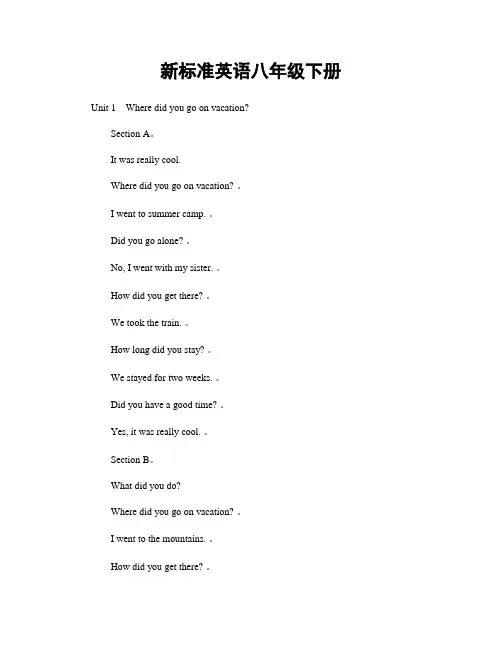
新标准英语八年级下册Unit 1Where did you go on vacation?Section A。
It was really cool.Where did you go on vacation? 。
I went to summer camp. 。
Did you go alone? 。
No, I went with my sister. 。
How did you get there? 。
We took the train. 。
How long did you stay? 。
We stayed for two weeks. 。
Did you have a good time? 。
Yes, it was really cool. 。
Section B。
What did you do?Where did you go on vacation? 。
I went to the mountains. 。
How did you get there? 。
I went by bike. 。
How long did you stay? 。
I stayed for a week. 。
What did you do? 。
I went hiking. 。
Did you go alone? 。
No, I went with my friends. 。
How was the weather? 。
It was really warm. 。
Did you have a good time? 。
Yes, I had a great time. 。
Section C。
What did you do last weekend? What did you do last weekend? 。
I went to the beach. 。
Did you go alone? 。
No, I went with my family. 。
![[初二英语]新课标人教版8年级下册3a课文及翻译](https://uimg.taocdn.com/a486825827284b73f24250d0.webp)
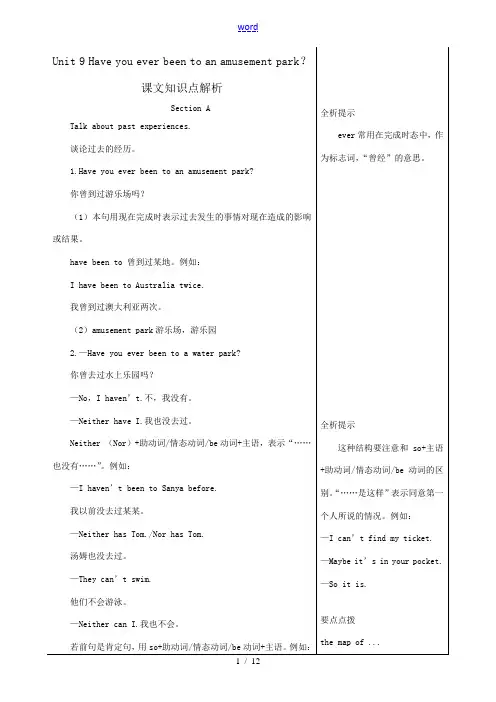

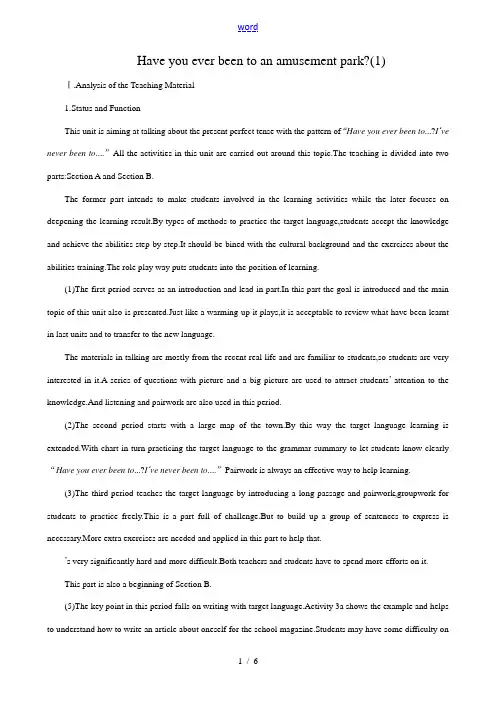
Have you ever been to an amusement park?(1) Ⅰ.Analysis of the Teaching Material1.Status and FunctionThis unit is aiming at talking about the present perfect tense with the pattern of“Have you ever been to...?I’ve never been to....”All the activities in this unit are carried out around this topic.The teaching is divided into two parts:Section A and Section B.The former part intends to make students involved in the learning activities while the later focuses on deepening the learning result.By types of methods to practice the target language,students accept the knowledge and achieve the abilities step by step.It should be bined with the cultural background and the exercises about the abilities training.The role play way puts students into the position of learning.(1)The first period serves as an introduction and lead-in part.In this part the goal is introduced and the main topic of this unit also is presented.Just like a warming-up it plays,it is acceptable to review what have been learnt in last units and to transfer to the new language.The materials in talking are mostly from the recent real life and are familiar to students,so students are very interested in it.A series of questions with picture and a big picture are used to attract students’ attention to the knowledge.And listening and pairwork are also used in this period.(2)The second period starts with a large map of the town.By this way the target language learning is extended.With chart in turn practicing the target language to the grammar summary to let students know clearly “Have you ever been to...?I’ve never been to....”Pairwork is always an effective way to help learning.(3)The third period teaches the target language by introducing a long passage and pairwork,groupwork for students to practice freely.This is a part full of challenge.But to build up a group of sentences to express is necessary.More extra exercises are needed and applied in this part to help that.’s very significantly hard and more difficult.Both teachers and students have to spend more efforts on it.This part is also a beginning of Section B.(5)The key point in this period falls on writing with target language.Activity 3a shows the example and helps to understand how to write an article about oneself for the school magazine.Students may have some difficulty onwords in writing.This exercise can help students form a habit of writing something using words they can find in their own vocabulary.(6)The sixth period is a summary and consolidation of the whole unit.The reading and writing practice are provided using the target language presented in this unit.At last students should plete the exercises to enhance the target language learning.(7)In the seventh period we’ll deal with reading:Stars from Asia.2.Teaching Aims and Demands(1)Knowledge ObjectIn this unit students will learn to talk about past experiences.(2)Ability ObjectsTo train students’ listening skill.To train students’ speaking skill.To train students’ reading skill.To train students’ writing skill.To train students’ municative petence.(3)Sensibility and ValueTo be interested in speaking in English.To enable to ask for help when having difficulty in learning.To help students realize the importance of cooperation.3.Teaching Key PointsTo learn the key vocabulary and the target language.To learn to talk about the past experiences.To learn the sentence pattern“Have you ever been to...?I’ve never been to....”4.Teaching DifficultiesTo train students’ reading skill.To train students’ writing skill.To train students’ integrating skills.5.Studying WaysUsing context.Role playing.Ⅱ.Language FunctionTalk about past experiences.Ⅲ.Target LanguageHave you ever been to an amusement park?No,I’ve never been to an amusement park.Yes,I have.I went there last year.Ⅳ.StructuresPresent perfect tense.Simple past tense.Present progressive as future.Ⅴ.V ocabularySpace museum,amusement park,water worldPeru,Hollandtour guide,flight,attendantⅥ.Recyclingzoo,aquarium,hotelrestaurant,Japan,South Americabus,boat,subwayⅦ.Learning StrategiesUsing context.Role playing.Ⅷ.Teaching TimeSeven Periods.The First PeriodⅠ.Teaching Aims and Demands1.Knowledge Objects(1)Key vocabulary(2)Listening practicePairwork(3)Target languageHave you ever been to an amusement park?Yes,I have.I went to Fun Times Amusement Park last year.Have you ever been to a water park?No,I haven’t.Neither have I.Let’s go to Water City tomorrow.2.Ability ObjectsTo train students’ listening skill.To train students’ speaking skill.3.Sensibility and ValueTo be interested in taking part in all kinds of activities in an English class. Ⅱ.Teaching Key PointsKey vocabulary.Target language.Ⅲ.Teaching DifficultiesListening practice.Pairwork.Ⅳ.Teaching MethodsScene teaching method.Listening and speaking methods.Pairwork.Ⅴ.Teaching AidsA tape recorder.A projector.Ⅵ.Teaching ProceduresStep ⅠGreet the class and check the homework.Step ⅡSection A 1aFirst ask students to read the names of these places.Which of these places would you like to visit?Rank them from 1 to 5.Then have different students share their answers with the whole class.Step Ⅲ1bListen and try to find out.Have these students ever been to these places?Check (√)the boxes.Play the tape for students and ask them to finish the activity on their own.Step Ⅳ1c PairworkFirst ask two students to read the sample dialogue.A:Have you ever been to an aquarium?B:No.I haven’t.How about you?Ask and answer questions about the places in the picture above.(Show the picture on the screen.)Step ⅤSummaryThis class we’ve learned some key words and the target language.Step ⅥHomeworkLearn the new words by heart.Step ⅦBlackboard Design。
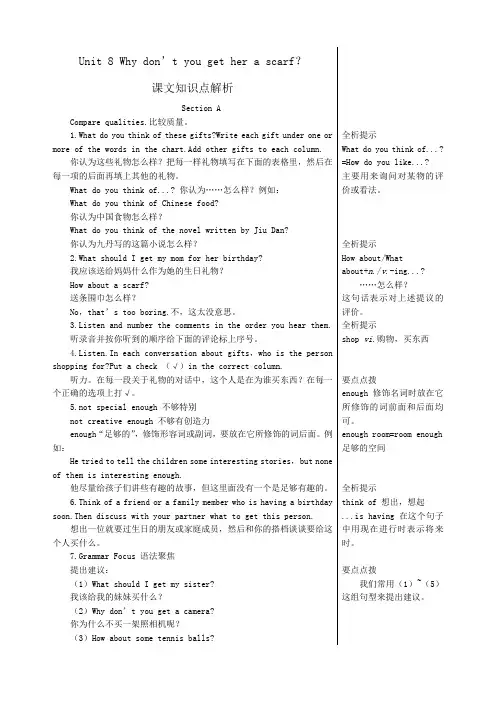
Unit 8 Why don’t you get her a scarf?课文知识点解析Section ACompare qualities.比较质量。
1.What do you think of these gifts?Write each gift under one or more of the words in the chart.Add other gifts to each column.你认为这些礼物怎么样?把每一样礼物填写在下面的表格里,然后在每一项的后面再填上其他的礼物。
What do you think of...? 你认为……怎么样?例如:What do you think of Chinese food?你认为中国食物怎么样?What do you think of the novel written by Jiu Dan?你认为九丹写的这篇小说怎么样?2.What should I get my mom for her birthday?我应该送给妈妈什么作为她的生日礼物?How about a scarf?送条围巾怎么样?No,that’s too boring.不,这太没意思。
3.Listen and number the comments in the order you hear them.听录音并按你听到的顺序给下面的评论标上序号。
4.Listen.In each conversation about gifts,who is the person shopping for?Put a check (√)in the correct column.听力。
在每一段关于礼物的对话中,这个人是在为谁买东西?在每一个正确的选项上打√。
5.not special enough 不够特别not creative enough 不够有创造力enough“足够的”,修饰形容词或副词,要放在它所修饰的词后面。

Unit 9 Have You Ever Been to an Amusement Park?一、学习目标:1.掌握现在完成时的用法;2.了解一般过去时、现在完成时和现在完成进行时的意义的区别;3.能够准确使用多种时态谈论自己的经历。
二、学习重点难点:1. 现在完成时由主语+have/has+过去分词构成。
其主要用法如下:I.在未指明具体时间的情况下,现在完成时动词通常可以表示在说话之前已经完成,而后果或影响至今仍存在的动作。
例如:The concert has started. 音乐会已经开始。
I have had breakfast. 我已吃过早饭。
注意:have gone to 和have been to 在意义上有区别。
例如:He has gone to Hong Kong. 他到某某去了。
(他已前往某某,或在途中,或已到达。
说话人暗示他现在不在现场。
)He has been to Hong Kong. 他曾到过某某。
(说话人认为他过去到过某某,现在已不在该地。
言外之意他对某某有所了解。
)II. 现在完成时动词可以表示开始于过去持续到现在(也许还会继续进行下去)的动作或状态。
例如:1) I have studied English since last year. 我从去年开始学习英语。
2) She has lived in Beijing for five years. 她住在已经五年了。
注意:e, go , leave, arrive, buy, lose, receive, join, die, bury 和marry 等动词所表示的动作是一时的,不能延续的,故不能与for …,since …等开头的表示一段时间的状语连用。
不过,这些词用于否定句则可以与表示持续的时间状语连用,即动作的不发生是可以持续的。
例如:不能说:*He has e to Beijing for two years.*He has bought that book for three weeks.*He has joined the Army for one and a half years.*His grandma has died for nine months.* I have received his letter for a month.可以说:He has been in Beijing for two years.He has had that book for three weeks.He has been in the army for one and a half years.His grandma has been dead for nine months.I haven't received his letter for almost a month.或者:It is two years since he came to Beijing.It is three weeks since he bought that book.It is one and a half years since he joined the Army.It is nine months since his grandma died.2. 现在完成时把过去的动作和现在的结果联系起来,一般过去时只限于表示过去的动作本身,与现在的结果无关。
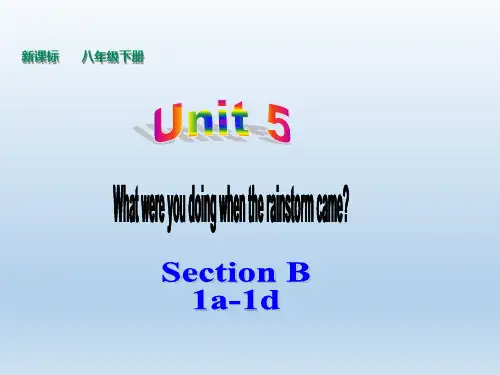
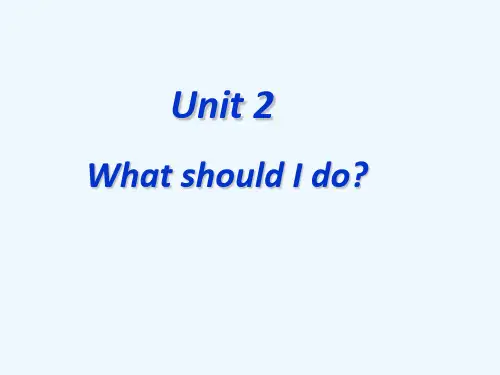
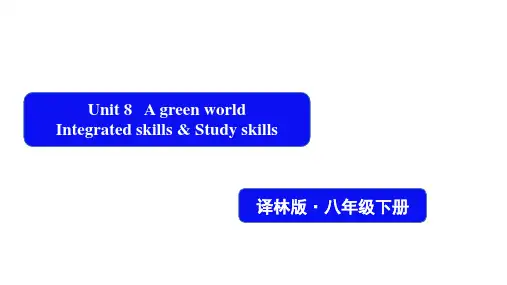
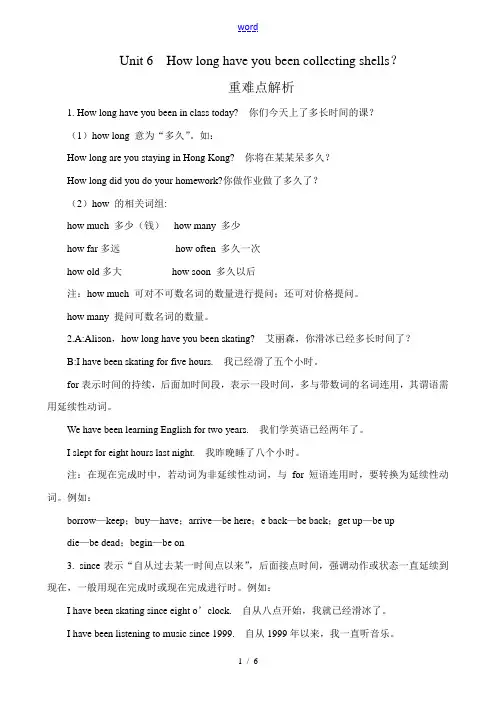
Unit 6 How long have you been collecting shells?重难点解析1. How long have you been in class today?你们今天上了多长时间的课?(1)how long 意为“多久”。
如:How long are you staying in Hong Kong?你将在某某呆多久?How long did you do your homework?你做作业做了多久了?(2)how 的相关词组:how much 多少(钱)how many 多少how far多远how often 多久一次how old多大how soon 多久以后注:how much 可对不可数名词的数量进行提问;还可对价格提问。
how many 提问可数名词的数量。
2.A:Alison,how long have you been skating?艾丽森,你滑冰已经多长时间了?B:I have been skating for five hours.我已经滑了五个小时。
for表示时间的持续,后面加时间段,表示一段时间,多与带数词的名词连用,其谓语需用延续性动词。
We have been learning English for two years.我们学英语已经两年了。
I slept for eight hours last night.我昨晚睡了八个小时。
注:在现在完成时中,若动词为非延续性动词,与for短语连用时,要转换为延续性动词。
例如:borrow—keep;buy—have;arrive—be here;e back—be back;get up—be updie—be dead;begin—be on3. since表示“自从过去某一时间点以来”,后面接点时间,强调动作或状态一直延续到现在,一般用现在完成时或现在完成进行时。
例如:I have been skating since eight o’clock.自从八点开始,我就已经滑冰了。
冀教版新课标八年级英语下册教案英语教案的教学设计直接决定了是否能够上好一节英语课,下面是小编为大家精心整理的冀教版新课标八年级英语下册教案,仅供参考。
冀教版新课标八年级英语下册教案范文一、教材依据: Unit1: Spring is coming!Lesson 4: The Spring City二、教材分析:本单元围绕春天展开中心话题,描述了春天的天气和户外活动,加强了同学们对异国文化的了解和对祖国文化的热爱提高了学生学习英语的兴趣。
三、学情分析:现在初二的学生对于英语学习应该具有一定的基础和方法,但我们所处在山区农村中学,从初一才开始接触英语,所以对于英语的学习还没有掌握好的方法,学生在学习中还存在许多问题。
对于所学句子还不能在平时灵活运用,所以课堂中老师应尽可能多的运用多种教学方法来引导学生学习。
四、教学目标:1、知识与技能目标掌握本课的单词,了解春城——昆明的美景,并能在听听录音时,有目的的获取所需关键信息。
2、过程与方法目标通过听录音,自读及小组合作的方法学习课文,让学生热爱春天,热爱大自然!3、情感态度与价值观能通过谈论春天的天气,温度,空气和植物,让学生了解春天,热爱春天,了解异国文化和祖国文化的差异,拥抱大自然!五、教学重难点1、单词2、短语及语法六、教法与学法小组讨论、合作探究、教师指导七、课型新授八、教学过程Step 1.Lead-inA warming-upA sayingStep 2.pictures show and new words, then, listeningShow some pictures about spring and learn the new words by playing a game, the do the listening about the text and answer one simple question.What is the spring city?It’s Kunming.Step 3.ReadingAsk several students to read the text and pay attention to the new words, the students read it again, and discuss together about the four questions in “Let’s Do It.part1”Step 4. ListeningDo the listening in “Let’s Do It!”part2, listen to it twice, and then invite some students to answer them.Step 5.DiscussingDivide the class into small groups; write the following words on the blackboard:Air /weather/ plants/ and outdoor activities.Step nguage points1. feel like /sound like / smell like / taste likefeel like doing sth.2. because and because ofBecause +句子Because of + n./pron./doing3. hundreds of /基数词+单位名词(hundred /thousand/million/billion)4. think of =consider5. all over the world =around the world6. all year round7. plenty of=a lot of =lots of8. long for= look forward toStep 6.Homework1、Write a short passage about spring in your hometown2、Preview Lesson 5Step 7.Summary:Review the text is very important. The students know what they will take to the class, what is useful to the study. Let them to talk about The Spring City. --- Its air, weather, plants and the outdoor activities in spring.九、板书设计:Lesson 4: The Spring CityAir weather plants and the outdoor activities十、教学反思:本节课在前几节课学习的基础上进一步来学习春天,通过运用多媒体向学生展示了春天的景色。
人教版新目标英语八年级下册Unit 5 说课稿Unit 5 If you go to the party, you’ll have a great time!Section A (1a-1c)说课稿各位评委、老师:大家好。
今天我说课的内容是人教版新目标英语八年级下册第五单元If you go to the party, you’ll have a great time! Section A (1a-1c)。
下面我将从教材分析、学情分析、教学目标、教学重难点、教法方法、教学过程、板书设计与教学反思八个方面谈一下我对本节课的设计。
教材分析首先我就教材进行一下分析。
本单元的语言目标是(Adverbial clause)即用if引导的条件状语从句来谈论结果。
涉及到了多个话题。
如以不同的方式去参加聚会会出现的各种结果。
举行一次班级聚会会出现的各种结果。
在参加End of Y ear Party 时如果不遵守聚会规则会出现的各种结果。
加入或不加入专业足球队会出现的各种结果。
成为一名专业运动员或不成为一名专业运动员会出现的结果。
并且延升到了写作训练。
本课时是一般将来时态的延续,具有承前启后的作用。
学情分析作为八年级的学生,首次接触If引导的条件状语从句,在接受上会有一些难度,这就要求教师在引入的时候要多从学生的角度思考。
根据“Talk about consequences”这一语言目标,鼓励学生展开想象,对某一条件下产生的结果进行大胆的判断。
教学目标分析根据《英语课程标准》总目标,结合本单元这部分的教学内容及对教材的分析,本课时的教学目标如下:知识目标:1.学会34页的新单词(consequence , jeans)。
2.学会have a great time, let in,be sorry短语。
3.句型: if引导的条件状语从句的句型结构。
能力目标:1.能准确运用If…,…will…句型,恰当运用现在时来表示将来时。